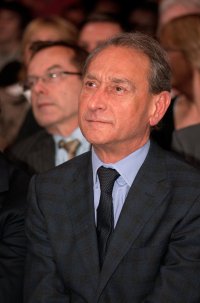Paris is Pledged to Incumbent Mayor Delanoë, Rising Star of the Left
Source: AFP
Translated by Angus B. GRIEVE-SMITH
 The Socialist Mayor of Paris, Bertrand Delanoë, who has led an energetic campaign to transform the city, appeared to be guaranteed a comfortable reelection, thanks to a divided right-wing opposition that has been reduced to accusing him of using the capital as a platform for his national ambitions.
The Socialist Mayor of Paris, Bertrand Delanoë, who has led an energetic campaign to transform the city, appeared to be guaranteed a comfortable reelection, thanks to a divided right-wing opposition that has been reduced to accusing him of using the capital as a platform for his national ambitions.
Mr. Delanoë, 57, and his left-wing electoral list were estimated to receive 43% of votes in the first round on March 9 and 57% in the second round on March 16, according to a poll by CSA published at the end of February.
In order to gain the maximum number of seats in the 20 districts of Paris – each one also electing its own mayor – Mr. Delanoë will have to manage a complicated coalition strategy with the Green Party, his rebellious allies estimated to receive 5% of votes. He must also take into account the centrist Mouvement Démocrate party, which has made inroads with an estimated 9% of votes.
Facing a mayor who is sure of himself, who claims to be “neither anxious nor euphoric,” Françoise de Panafieu, 59, the candidate of the right-wing UMP party, which holds power in the national government, has largely conceded defeat.
Acknowledging a “difficult” campaign, she claims to be challenging “not the incumbent mayor,” but “the candidate for general secretary of the Socialist Party,” who will make the city “a weapon against the government.”
Mr. Delanoë, who has until now refuced to confirm it, is widely considered the likely challenger to Ségolène Royal to take the leadership of the Socialists and run for President of the country in 2012.
A landslide victory in the mayoral election will reinforce his stature. Former President Jacques Chirac, who ran the capital for almost 20 years, had used Paris as a stepping stone to national office.
The first left-wing mayor of Paris, elected in 2001, Mr. Delanoë has run an activist campaign.
In response to those who accused him of allowing Paris to become a city of “rich people” because of the housing crisis, he implemented measures to protect public spaces and promised to relieve the apartment shortage by removing the prohibition against high-rise buildings.
During his first term, he attracted attention by imposing a drastic reduction of lanes dedicated to car traffic in favor of mass transit and bicycle routes, and opened a streetcar line along the southern edge of the city.
Mr. Delanoë, one of the first politicians to acknowledge his homosexuality, was able to satisfy the aspirations of upper-class “bobos” (“bourgeois-bohèmes,” or yuppies). His detractors accused him of being authoritarian and autocratic.
He staked his repuation on media-friendly initiatives like “Paris Plage,” the summer-long transformation of the highways along the Seine into car-free recreation areas, and Velib’, the bicycle rental system popular with Parisians.
The right wing has had little success in attacking the Mayor on this urban policy shared by many large European cities. According to a recent poll, more than 60% of self-identified conservatives claimed to be satisfied with the results that Delanoë had achieved.
In an attempt to draw this conservative support away from Delanoë, the UMP is running celebrity candidates like Finance Minister Christine Lagarde and Justice Minister Rachida Dati. But these efforts could backfire thanks to resulting accusations of “carpetbagging” and creation of dissident electoral lists.
In fact, the UMP, which now holds only eight district mayoralties out of 20, could lose many of them in this city of two million where the mayoral election has always been more than a local contest.
Original: Paris promise au maire sortant Delanoë, étoile montante de la gauche, March 5, 2008. Image: © Marie-Lan Nguyen / Wikimedia Commons